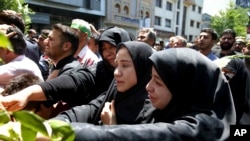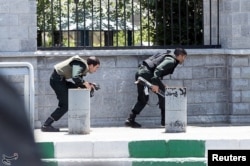Iranian forces have staged operations against dissidents they say were planning terror attacks during Ramadan in the wake of twin suicide assaults on symbolic sites in Tehran. Officials linked one group to Saudi Arabia, which it claims is trying to destabilize the country.
Intelligence forces killed three members of the small Ansar al-Forqan group and arrested five others Wednesday in the southeastern city of Chabahar in Sistan and Balouchestan province, seizing seven suicide vests and a large amount of ammunition, according to state-run media.
Tehran claims the fundamentalist Sunni group is linked to al-Qaida, with possible support from Saudi Arabia.
In a second incident, Iran's Fars News Agency reported Friday that several alleged "terrorists" had been killed or wounded in clashes with Iranian Revolutionary Guard Corps members in the Qasr-e Qand region.
Explosives confiscated
An IRGC statement said 700 kilograms of explosives had been confiscated, along with a car packed with another 600 kilograms of explosives and five bombs. It was not clear whether the targets of the assault belonged to a specific group.
The details of the operations could not be independently verified. They were carried out as Iran was still reeling from the June 5 attacks on Parliament and the mausoleum of the Islamic Republic's founder, Ayatollah Ruhollah Khomeini, that killed at least 17 people and injured several others.
Islamic State claimed responsibility, but Iran has linked the attacks to Saudi Arabia, its main rival for influence in the region, claiming Riyadh is trying to destabilize the country by supporting dissidents.
IRGC Commander Mohammed Ali Jafari told Fars that Iran had "precise information" that Saudi Arabia "has asked terrorists to carry out operations in Iran."
The Fars report said the Saudis might have recruited Ansar al-Forqan to carry out attacks.
"The intelligence shows that the Saudis have hired mercenaries from the neighboring states to create insecurity inside Iran," said Mahmoud Alavi, the Iranian intelligence minister. He alleged that the U.S. and Israel also support terrorist groups in the region.
Rising tensions
Tensions between longtime rivals Saudi Arabia and Iran have escalated in recent weeks after the Saudis and their Gulf partners cut ties to Qatar, citing, in part, its association to Iran and Tehran's alleged link to terrorism.
Before the June 5 attacks in Tehran, Saudi Foreign Minister Adel al-Jubeir said Iran "must be punished" for its disruptive role in the region.
Mohammed bin Salman, deputy crown prince and defense minister of Saudi Arabia, slammed Iran recently for its intrusion in Arab world affairs and threatened using force inside Iran's borders.
"We won't wait for the battle to be in Saudi Arabia," he said. "Instead, we'll work so that the battle is for them in Iran."
Ansar al-Forqan's website says its mission is fighting the "cruel Shi'ite regime of Tehran" for persecution of the country's Sunni minority.
"Since this cruel Shi'ite regime only deprives Sunni Muslims of their rights, we have no other means but to fight back," Ansar al-Forqan said in a video statement last year.
It is an ethnic Baloch group and active only in poverty-racked Sistan and Balouchestan. Blamed for launching several attacks on military outposts in the region and targeting military vehicles with short-range missiles, the group is considered to have strong ties to Salafism ideology.
"Their motto of 'Either martyrdom or Sharia' depicts the level of their commitment to the execution of Islamic decrees," said Abdolsatar Doshoki, a U.K.-based Baloch affairs analyst.
Estimates put the number of members from 200 to more than 400.
Recruiting targets
"The group mostly recruits from young Balochs from poor families who are strongly religious, poor and frustrated," said Azhar Shoeibi, a Sweden-based Balouch asylum-seeker from the region.
The group reportedly is ill-funded and receives only ammunition support from Afghan and Pakistani militant allies.
"The militants usually harbor in Pakistan and receive enormous support from Pakistani tribes," Doshoki said.
In February 2013, Iran and Pakistan signed a security agreement under which both countries are required to cooperate in combating organized crime and fighting terrorism, as well as countering threats to national security. Iran has repeatedly called on Pakistan to comply with the terms of the agreement.





